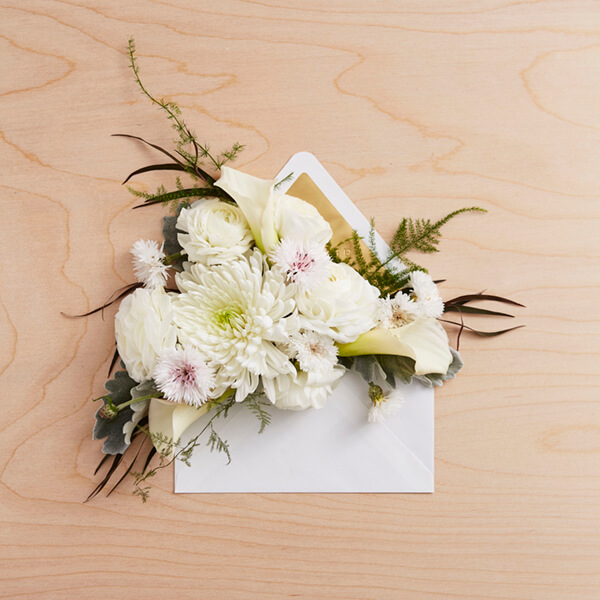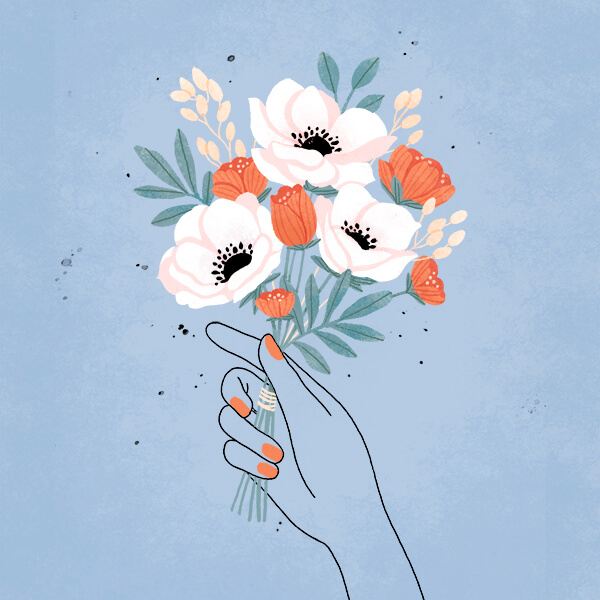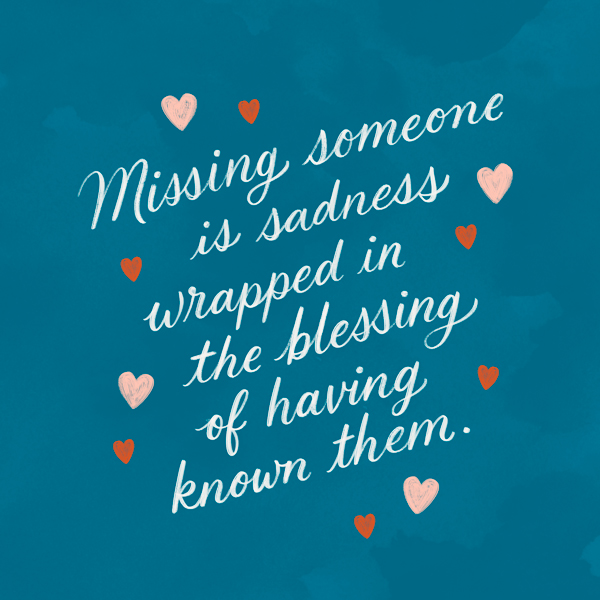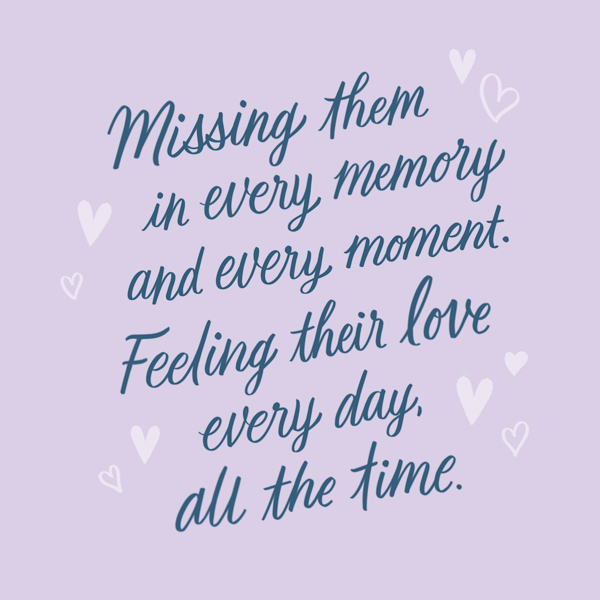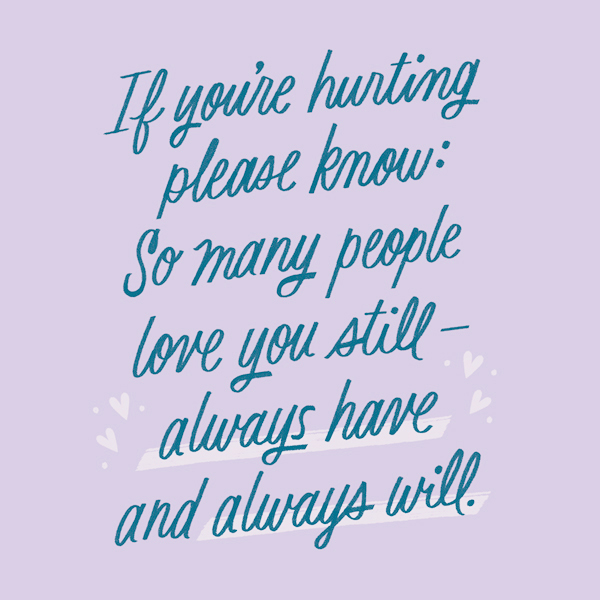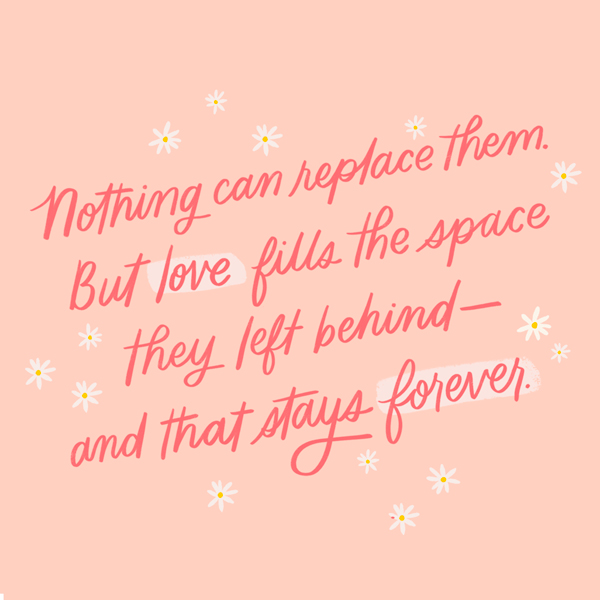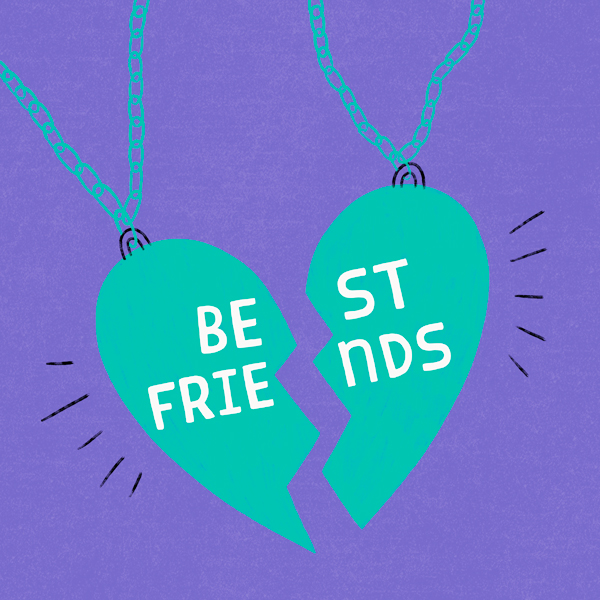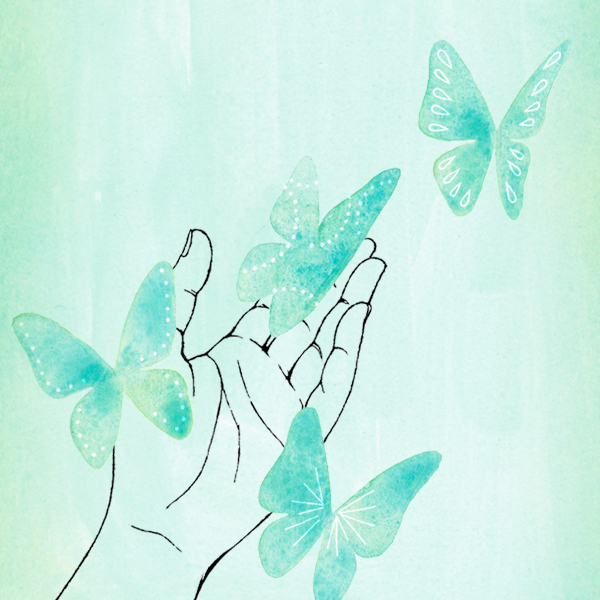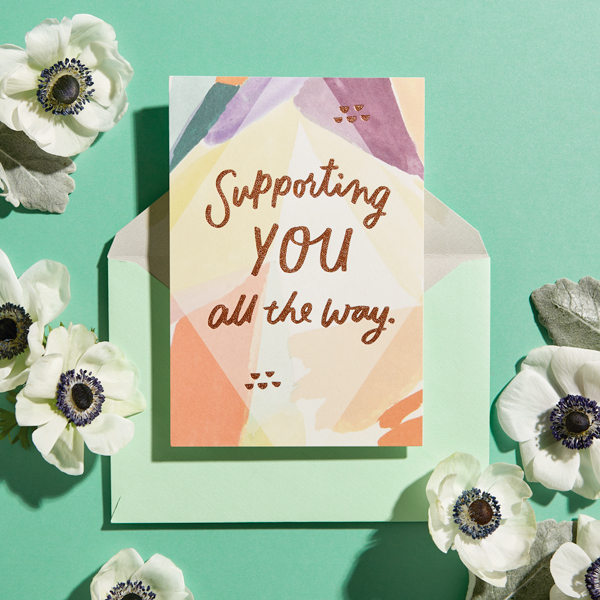Continuing grief support: How to help someone who is grieving over time
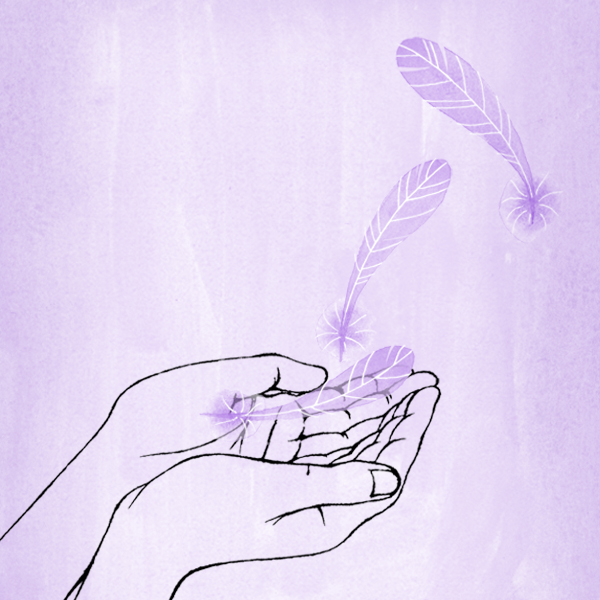
Grief doesn’t follow a schedule. There’s no deadline for the feelings of sadness, anger and loneliness to subside after a loss—especially in the first year, which is filled with holidays, memories and milestones that trigger fresh pain. So how do you help someone who is grieving when they need you the most: as they try to figure out their life after a loved one’s death?
Inspired? Create and share by tagging @Hallmark.
Give support after the funeral
The magnitude of losing someone only begins with the funeral or memorial service. The first months can be extremely lonely as the reality sets in. Of course, there will still be good days, but life will be very different and pretty surreal.
The loss of a family member or close friend brings many life-altering changes and difficult, emotional work. Naturally, it all depends on who is missing from the once regular routine and what that means to your friend. Here are some examples:
- If a spouse has died, that may mean selling a home and moving to a smaller place, incurring a burden of debt, possibly finding new employment and emotionally supporting the kids.
- The loss of an elderly parent may require a complicated clean-out, dividing possessions between family members and planning an estate sale. There might be uncomfortable conversations about wills and inheritance.
- The death of a child or teenager could involve everything from communicating with their school, to paying steep medical bills and sudden funeral costs, to details like managing their social media accounts.
- Losing a sibling may mean taking on newfound responsibilities: spending more time with the bereaved parents, picking up nieces and nephews from baseball practice, or finding a way to answer the age-old question we’ve all answered a million times in our lives: Do you have any brothers or sisters?
- When a very close friend dies, long-held routines can shatter—no more Saturday morning coffees, no one to call first for advice and reassurance, an empty seat in the pew at church.
Your friendship will morph and evolve, too.
Schedule regular check-ins
The first year of the loss is a critical time not to fade out of the picture, and a standing, scheduled check-in is a great way to show your friend you care.
It doesn’t have to be a big event or major commitment either. Brainstorm ways you can give support and mark your calendar for a weekly call, text or activity. (Of course, you’ll have to gauge the frequency of calls and visits based on your unique relationship. Trust your intuition.)
Spending time together
Here are some weekly activities you could do together:
- A coffee run
- A FaceTime, Zoom or Skype happy hour
- An afternoon of volunteering
- A movie or performance
- A walk, hike or stroll
And a few more specific ideas from friends who shared interests with someone in mourning:
- Zombie movie nights
- British TV binge-watching extravaganzas
- Weekly jam sessions (i.e., playing music, but making jam sounds cool, too)
- Monthly mani/pedis
- Dog-walking at a local shelter
Supporting in-person and from a distance
Brainstorm ways you can give support through this year of change. To get you started, here are more things you can do that are easy but meaningful:
Thoughtful gestures
- Send just-because cards to let your friend know you’re thinking of them. It shows you care but also gives them some breathing room.
- Sign them up for a subscription box service, like meal kits or beauty products. Tailor it by asking yourself what your friend could really use right now to make their life easier or simply bring a smile to their face.
- When you’re out running errands, check to see if they need anything.
- Drop off a meal, a treat, a bunch of flowers or a potted plant—or have it delivered.
Memory-keeping
- Give them a journal to write down their reflections or memories of their loved one.
- Start a photo album or scrapbook for your friend with a picture or story to get them going. Offer to help them fill in the pages.
- Find an interesting container or card keeper for them to store letters, cards and bits of memorabilia.
Home projects
- Spend a few hours helping around the house or yard. Simple tasks can seem overwhelming when you’re depressed, especially when those responsibilities used to belong to someone else.
- Volunteer your gardening skills for planting a tree or shrub in their loved one’s memory. Research the meaning or symbolism behind certain trees and flowers, figure out the right time to plant and look for options for purchasing the plant.
- Offer to help sort belongings for storage or donation. Always let your friend lead on this one: If she’s a grieving widow or a mom who’s just lost her daughter, she may not be ready to give up any of their now-more-precious-than-ever belongings. Be there for her if she’s thinking about boxing up items, but don’t push her if she’s hesitant.
Want to know how to help a grieving friend from Day One? Check out these ideas for grief support in the earliest days.
Say the deceased’s name
People in mourning sometimes hesitate to bring up the deceased because they don’t want to make others uncomfortable, even when they’re craving a chance to talk. It may be intimidating at first, but don’t be afraid to talk about your friend’s loved one. You won’t be reminding them they lost someone—you’ll be reminding them that person mattered.
If you sense they want to talk, you can give them an opening like, “Sometime, when you’re feeling up to it, I’d love to hear more stories about your brother.” By showing interest in getting to know their loved one better, you’re giving a huge gift to your friend: keeping their family member in the story of their life.
Including those we love in our daily conversations, celebrations and traditions is also the ultimate honor to the person who died and the friend you love and care about. Show that you remember, no matter how long it’s been. We never forget the ones who’ve changed our lives and hearts.
Ideas for what to say
Here are some scenarios to get you thinking:
- You’re at a party and the parents there are humble bragging on their kids. If your friend lost a child (no matter the age), this may make them feel left out or sad about the dreams they didn’t get to see come to fruition. Turn to your friend and say, “I always thought it was so cool that Timothy did tae kwon do.” Or “Didn’t Mark love studying paleontology?”
- Your friend just got engaged and the happy news is really making her miss her mom. Reach out with some encouraging words to your friend, like, “I bet your mom is looking down right now, beaming with pride.” Or “I know your mom would’ve loved planning your wedding with you. I’m here to help, if you’d like.” You could even offer to brainstorm ways to remember her mother in the ceremony…a special flower in her bouquet, her mom’s favorite song or a locket with her photo in it, just to name a few.
- You and your friend are sitting in a coffee shop and her laugh suddenly reminds you of her sibling’s expressions. You might say, “You sound just like Roberta when you laugh.” Or “You know, has anyone ever told you that you and Michael have the same smile? I can see him in you.”
- It’s the holiday season and your friend will be home alone, without his wife by his side. Say, “I know Sadie loved getting together over the holidays, and we’d love it if you’d like to continue the tradition at our house.” Or “Ellen was about the most sparkling person I knew. We won’t let Christmas go by without remembering her warmth and joy.”
- You’re at a baby shower, where you run into your friend who’s been grieving the loss of her longtime partner. She had hoped to be married and have a child, too, but those dreams ceased with the sudden death of her significant other. You might say, “It’s so good to see you. I bet Juan would’ve been proud that you came today.” Or “It’s so nice to see your smile. I know it’s not the easiest thing to come to something like this, and I’d love to sit by you, if you’d like.”
Of course, use discretion and “read the room” when you bring up their loved one. Bringing up your friend’s loved one when others are around can make them feel emotionally exposed. Grief is personal and intimate, so double-check the environment before you share your thoughts.
Helpful tip: Don’t be afraid of tears. The strong emotions of grief mean they can come at any time and that crying can range from a few teardrops to uncontrollable weeping. Use your knowledge of your friend to know what they need, from a tissue to a hand to hold to someone to sit with them in silence.
Be gentle with their heart
This will be a raw year for your friend, so approach them with sensitivity and an empathetic heart. They may want hugs one day and want to be left alone the next. They may not joke around as much or joke way more than you think a grieving person would. People are complicated creatures. From the way we initially react to things to how we process information, we each have our own systems for coping.
Be ready to:
- Go with the flow
- Be present
- Stay attuned to your friend’s feelings
There will be ups and downs, often many in the same day. Hang in there. Being kind to your friend is softening the heartache more than you’ll ever know.
Remember grief is a journey
Whether it’s seven months or seventeen years, the person who’s no longer with us is still no longer with us…and that’s always going to be sad. There will always be moments when we wish our loved one were here. There will always be someone missing from the gang.
Remember:
- Remarrying doesn’t mean you stop loving a spouse who died.
- Having a baby doesn’t replace a child lost before or soon after birth.
- An “expected” death from age or a long-term illness still means they’re gone.
- Most of us will always miss our mom or dad no matter how long they’ve been gone.
- Losing someone with whom you had a complicated relationship doesn’t make it easier.
As caring people, we worry that we’re not doing enough or that we’re doing everything wrong. How do you make sure you’re not letting your friend down during their grief journey? There will never be the perfect answer for how to strike a balance because everyone is different.
All we can do is to reach out, consistently and sincerely. If your friend doesn’t reach back, it just might mean they’re in a place where they need time alone or space to reflect. Give them the breathing room they need, then after a while, try again.
With all of its common elements and stages, grief is mostly a journey that leads each of us in different directions. So, try your best to be prepared for the unknown. Then, take your friend’s hand, and walk beside them.
Shop Sympathy
See allYou may also like
See more-
Sympathy Sympathy messages: What to write in a sympathy card
Signing a sympathy card isn’t easy. We search for words. We wonder what would be comforting to hear. We worry about s...
-
Mother's Day When Mother’s Day is hard: Grieving on Mother's Day
Find a few ways to offer support and kindness when Mother's Day is hard.
-
Sympathy How to support a grieving friend
Advice on how to support a grieving friend, directly from people who went through it. Get ideas to show you care here.
-
Sympathy Sympathy gift ideas for offering your condolences and support
Many times, we don’t know what to say after a loss. It can be difficult to determine what will comfort a hurting frie...
-
Sympathy 75+ grief quotes to give you comfort and help you heal
Grieving the loss of a loved one feels different for everyone, and there’s no telling what will bring comfort on a ha...
-
Valentine's Day Ways to find comfort and hope when you’re grieving on Valentine’s Day (or support someone who is)
Grief is always hard, but especially on Valentine’s Day. From social media to stores to kids’ classrooms, it can feel...
-
Valentine's Day How to survive Valentine’s Day after a divorce or breakup
We know that ending a relationship can be extremely heartbreaking. It’s a very significant loss, and when Valentine’s...
-
Mother's Day Mother's Day without Mom: Remembering lost loved ones with new traditions
This Mother’s Day will be my third without my mom. She died just before Thanksgiving and Christmas in 2020, which mad...
-
Lifestyle How to write an obituary: What to say about the life of a loved one
Summarizing a loved one’s life can feel like an impossible task, especially when you’re grieving. It’s even more chal...
-
Card Ideas What to Say When Someone Loses a Pet
My first cat died when I was 8 years old. His name was Barnabus—after the soap opera vampire—and he was a handsome bl...
-
Friends How to survive a friendship breakup
There are a few things that I dreamed of having more than anything as a kid—like a golden retriever, my own room, mer...
-
Christmas A Christmas tribute: meaningful ways to weave memories of lost loved ones into new holiday traditions
For many of us, Christmas is the time of year when we miss our lost loved ones the most. Finding ways to memoriali...
-
Sympathy Grief and the holidays: Supporting friends through difficult days
Many of our favorite holiday memories include family members and our closest friends. So it’s no surprise that people...
-
Baby What to Say When a Friend Loses a Baby: Messages of Love and Support
Losing a baby, no matter how it happens—or how early in the pregnancy—is devastating. It’s a time of sadness when ...
-
Sympathy Grief support: How to help someone who is grieving immediately after a loss
When a friend suffers the loss of a loved one, their whole life changes. And we wonder: What can we do to help som...
-
Sympathy Grief support on anniversaries, birthdays and special occasions
When you’re supporting a friend through their grief, look to the calendar for cues about when they might need extr...
-
Sympathy Hospice Messages: What to Write to Someone Who is Dying
The end of a person’s life is an important time for friends and family members to reach out with words of caring, ...
-
Sympathy Grief and loss: how to comfort the grieving
The sympathy cards have been safely tucked away. The flowers have been careful...

